Emergency? Call 9-1-1
Non-Emergency? Call 1 (866) 876-5423
- Request a Paid Duty
- Find Crime in my Area
- Find My Local Police District
- Help Solve a Murder
- Report a Crime Online
- Get a Police Record Check
- Get Crime Prevention Tips
- Learn about YRP's Units/ Sections
- Register my Bike
- Submit a Complaint Against a Member
- Submit a Compliment
- View Current Motor Vehicle Collisions
- Work for YRP
- Volunteer with YRP

Every June, York Regional Police raises the flag of the Anishinabek Nation at all of our facilities to recognize Indigenous History Month and National Indigenous Peoples Day.
The flag raisings are a sign of respect and ongoing partnership with our Indigenous community, especially the Chippewas of Georgina Island.
In consultation with the Chippewas of Georgina Island members Staff Sergeant Josh McCue and Sergeant Will McCue, along with Chief Donna Big Canoe, the Anishinabek flag was chosen as it represents 39 First Nations throughout the province of Ontario.
We will continue to stand with our Indigenous community as allies and partners and work to support the reconciliation process.
We are also taking the opportunity to highlight a few of our amazing members from First Nations communities. We thank them for sharing their experiences with us.
Sergeant Will McCue
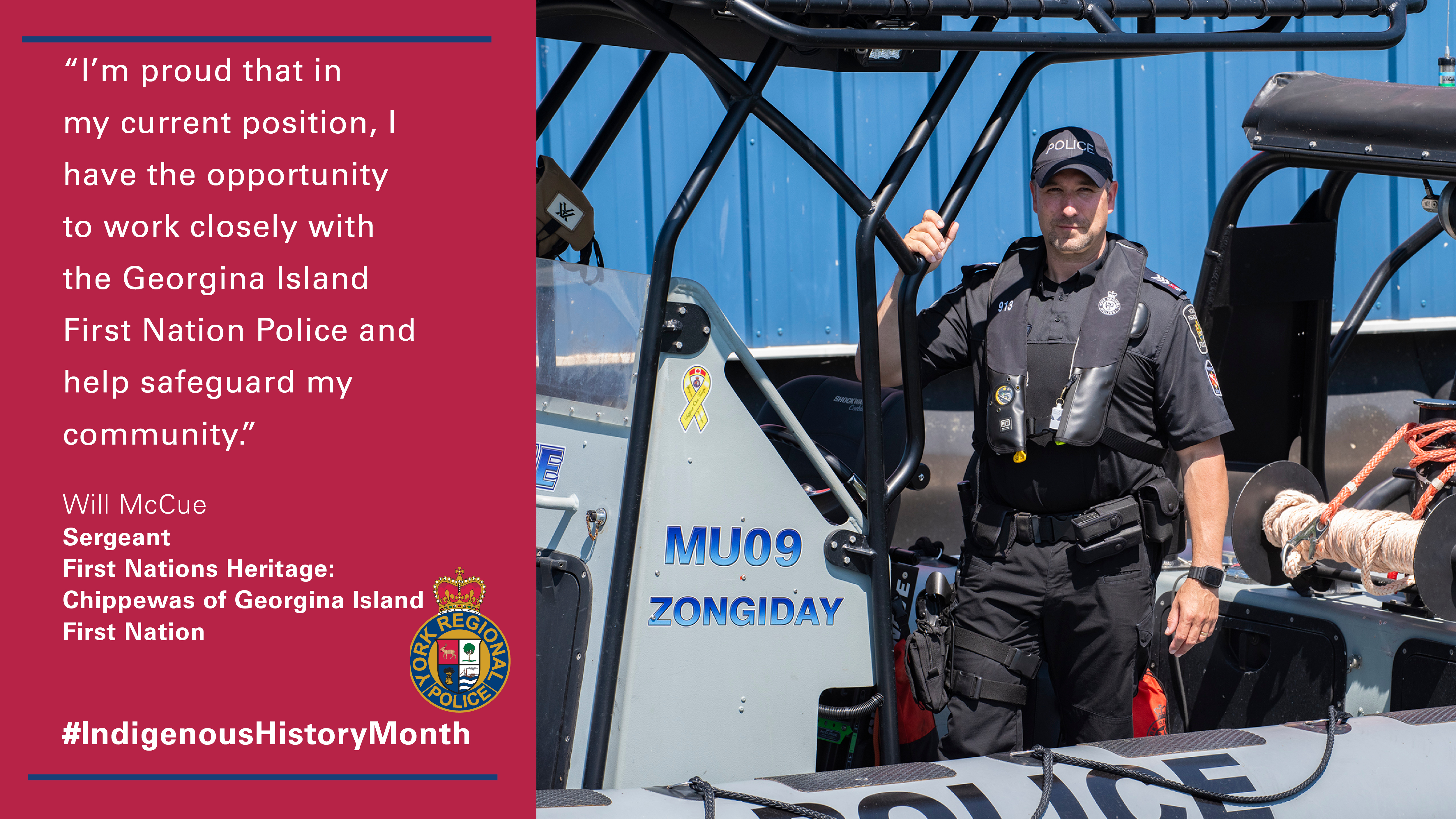
Position: Marine and Underwater Recovery Unit
Years of Service: 25
Work History: #1, #2, #3 Uniform, #1 & #3 CIB, Mobile Surveillance Unit, Homicide Unit, Professional Standards Bureau, Marine URT
First Nations Heritage: Chippewas of Georgina Island First Nation
Why did you choose a career in policing?
I decided to pursue a career in policing after I completed a high school co-op placement with the Ontario Provincial Police and worked a summer student with the First Nations Police. When I turned 18, I was hired as an auxiliary officer with the OPP and later hired as a cadet with YRP. The First Nations Police mentored me from the time I was in high school right up until I graduated from the Ontario Police College (OPC).
What is a career highlight from your policing career?
A highlight of my policing career was while I was working in uniform in 2005. My partner and I arrested a sexual predator who had planned on victimizing children. The offender was convicted in court and was designated as a dangerous offender. The case has been used in several OPC courses and set positive case law for law enforcement. I’m proud that I was able to safeguard our children. 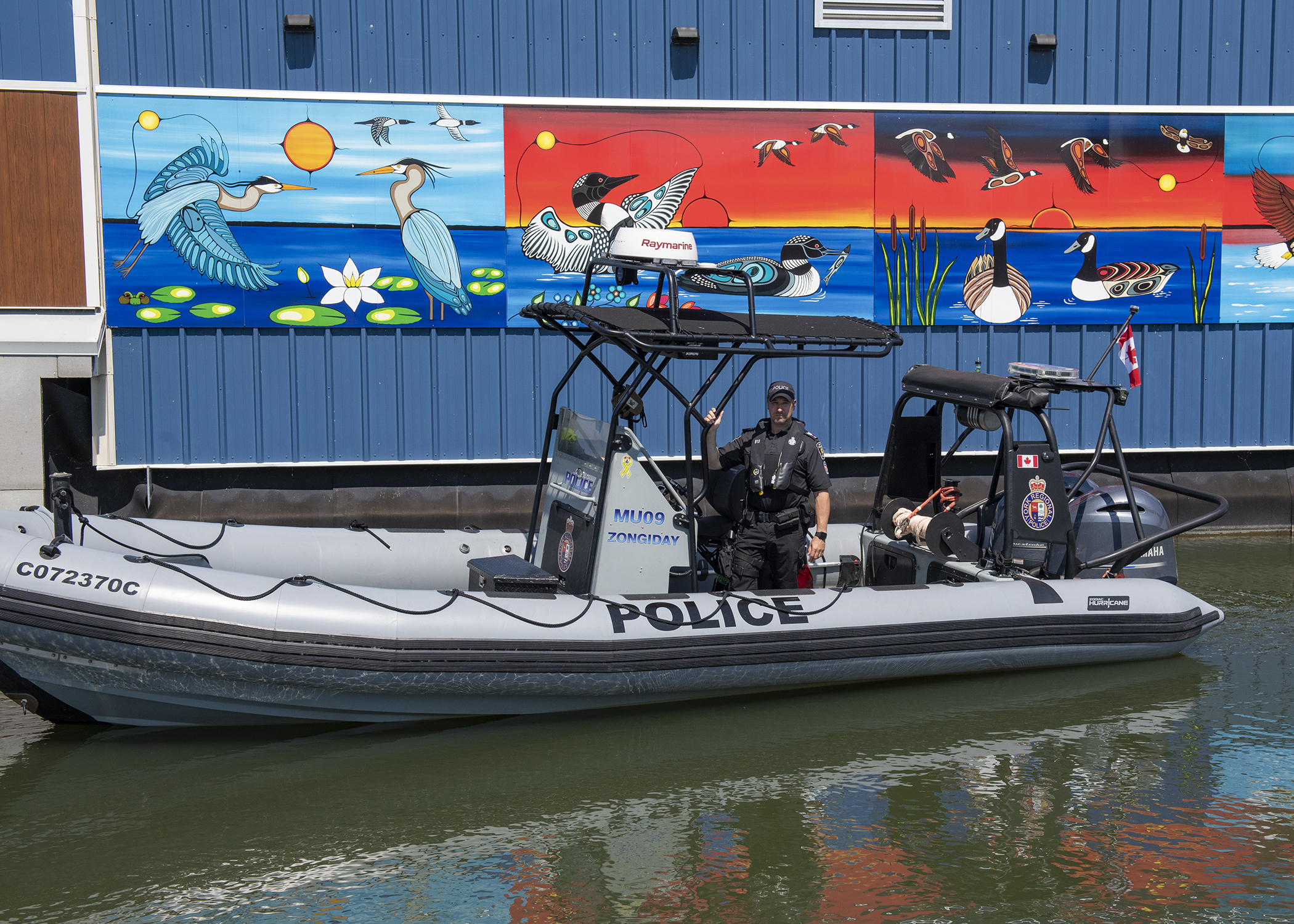
What advice do you have for anyone thinking of starting a career with YRP?
My advice is to have the mindset that a career with YRP is a career and not just a job. YRP has many opportunities to choose from: Frontline, investigations and operations. Set goals and work hard to achieve them.
How do you stay involved in your community?
In my current position in the Marine Unit, I have the opportunity to work closely with the Georgina Island First Nation Police and near my own community. I have been invited to represent YRP in community events on Remembrance Day, Truth and Reconciliation Day and Every Child Matters events on my First Nation.
In years past, I also volunteered with the Minor Hockey Association in my hometown.
What does National Indigenous History Month mean to you?
National Indigenous History Month is an opportunity to learn more about our history, culture and traditions and celebrate Indigenous people across Canada.
Constable Zack Leece
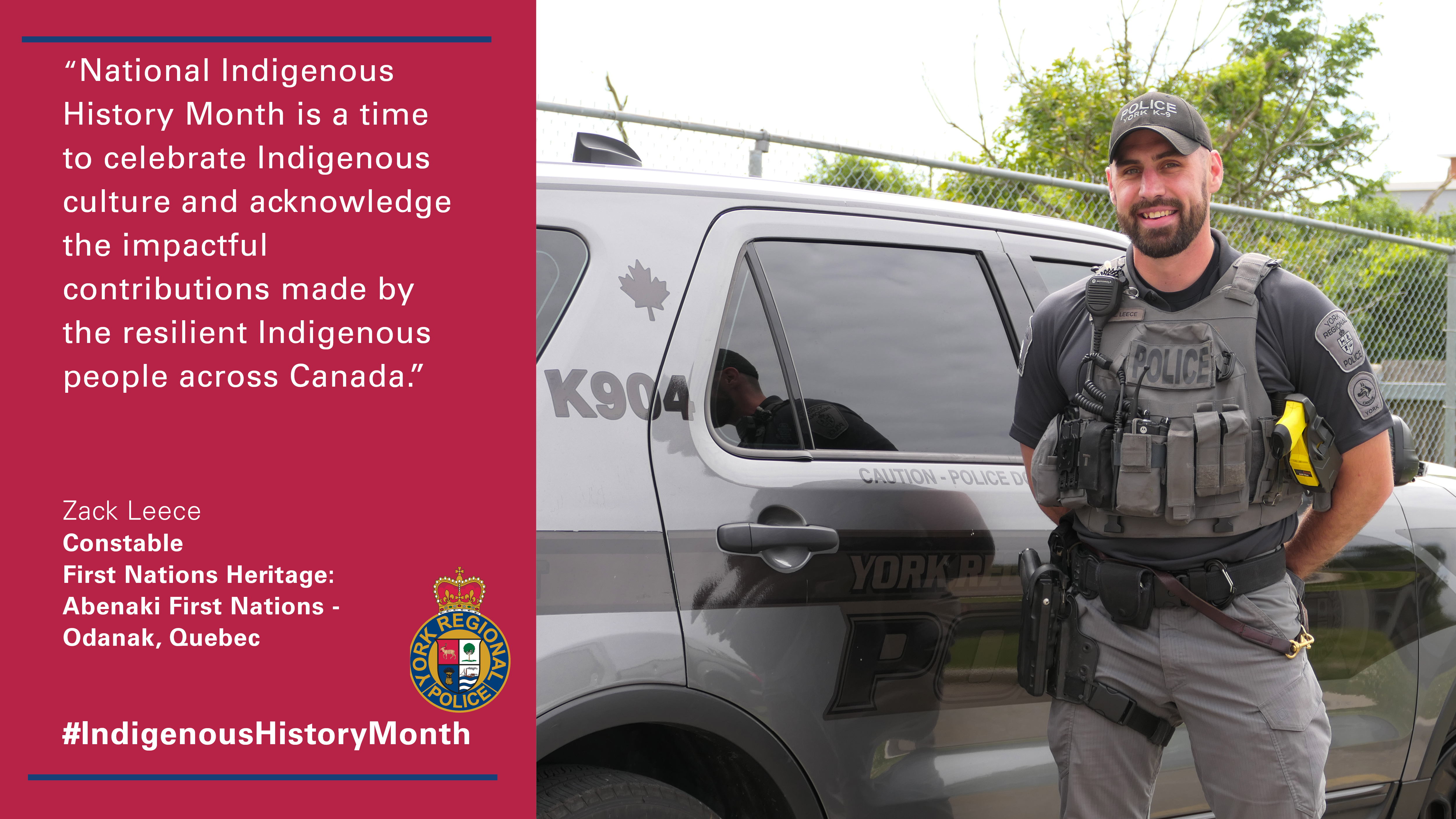
Position: Canine Unit, handler with Police Service Dog York
Years of Service: 9
Work History: First assigned to #2 District before moving to Canine. Also a coach officer, ice water rescue trained and five years with the Crowd Management Unit.
First Nations Heritage: (Tahamont) Abenaki First Nations - Odanak, Quebec
Why did you choose a career in policing?
This career offered an exciting chance to challenge myself everyday in such a wide variety of ways. Having the opportunity to prevent crime, make a difference and be there for people in need was very appealing to me from a young age.
What is a career highlight from your policing career?
For me it would be achieving my current position in the Canine Unit as a Handler. The process took a lot of hard work and I am truly grateful for the opportunity to go out on the frontline and respond to calls where a Police Service Dog is needed. 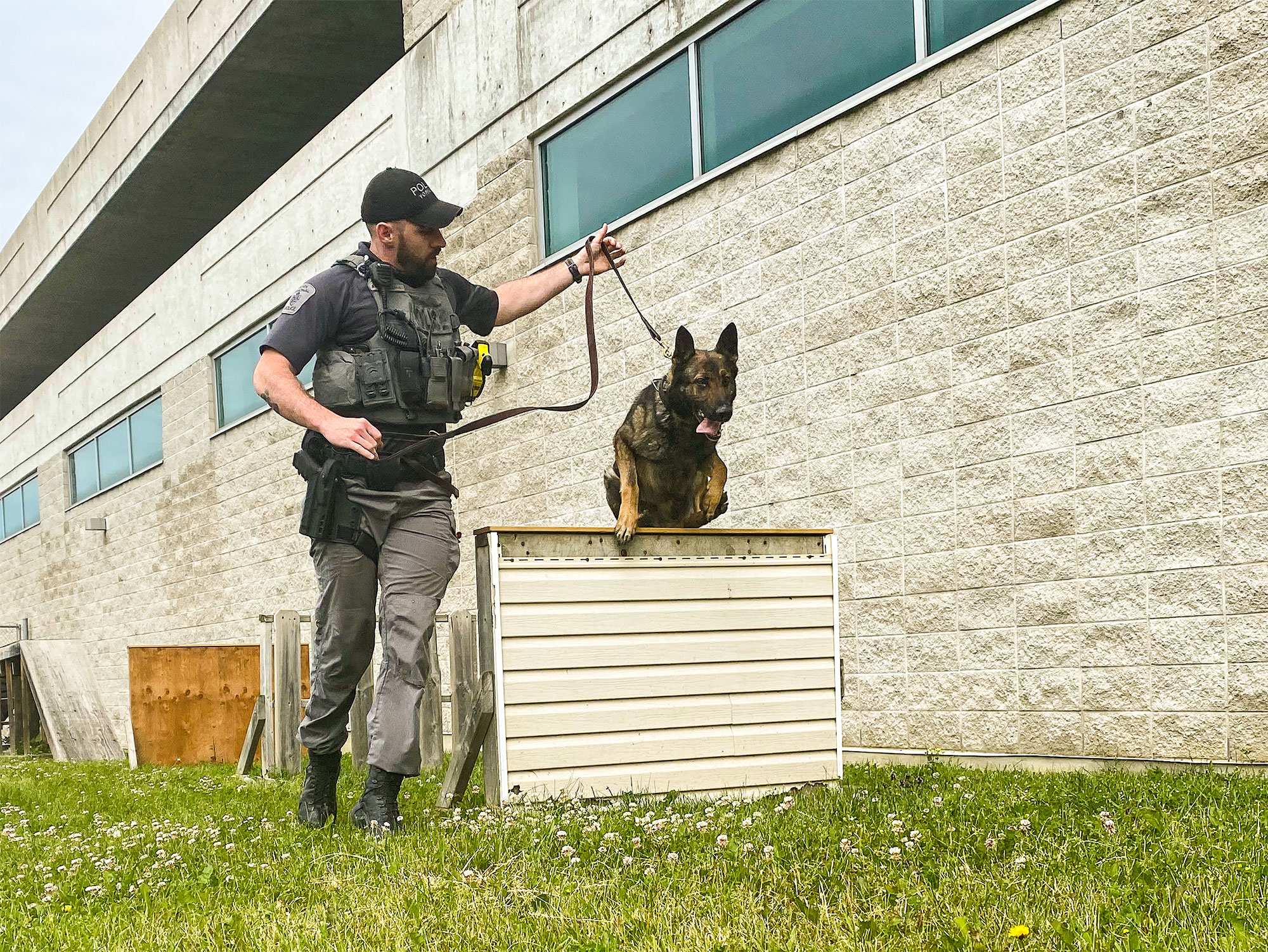
What advice do you have for anyone thinking of starting a career with YRP?
I would recommend seeking out information on the process and career itself. Not being afraid to reach out and ask a YRP member or recruiter questions. Anyone interested should also focus on enhancing or improving any current skills, or gaining new ones to improve their resume.
How do you stay involved in your community?
I volunteer with Big Brothers Big Sisters to stay connected to youth in our community and hopefully have a positive impact. Unfortunately, I didn’t have much of an opportunity growing up to connect with members of my Indigenous community. My great grandfather was Abenaki heritage but my mother was denied status due to restrictions under the Indian Act.
What does National Indigenous History Month mean to you?
This month is a time to celebrate Indigenous culture and acknowledge the impactful contributions made by the resilient Indigenous people across Canada. It is also a time to reflect on the hardships the Indigenous people have faced and learn from their tragic history.
Detective Constable Sean McCue
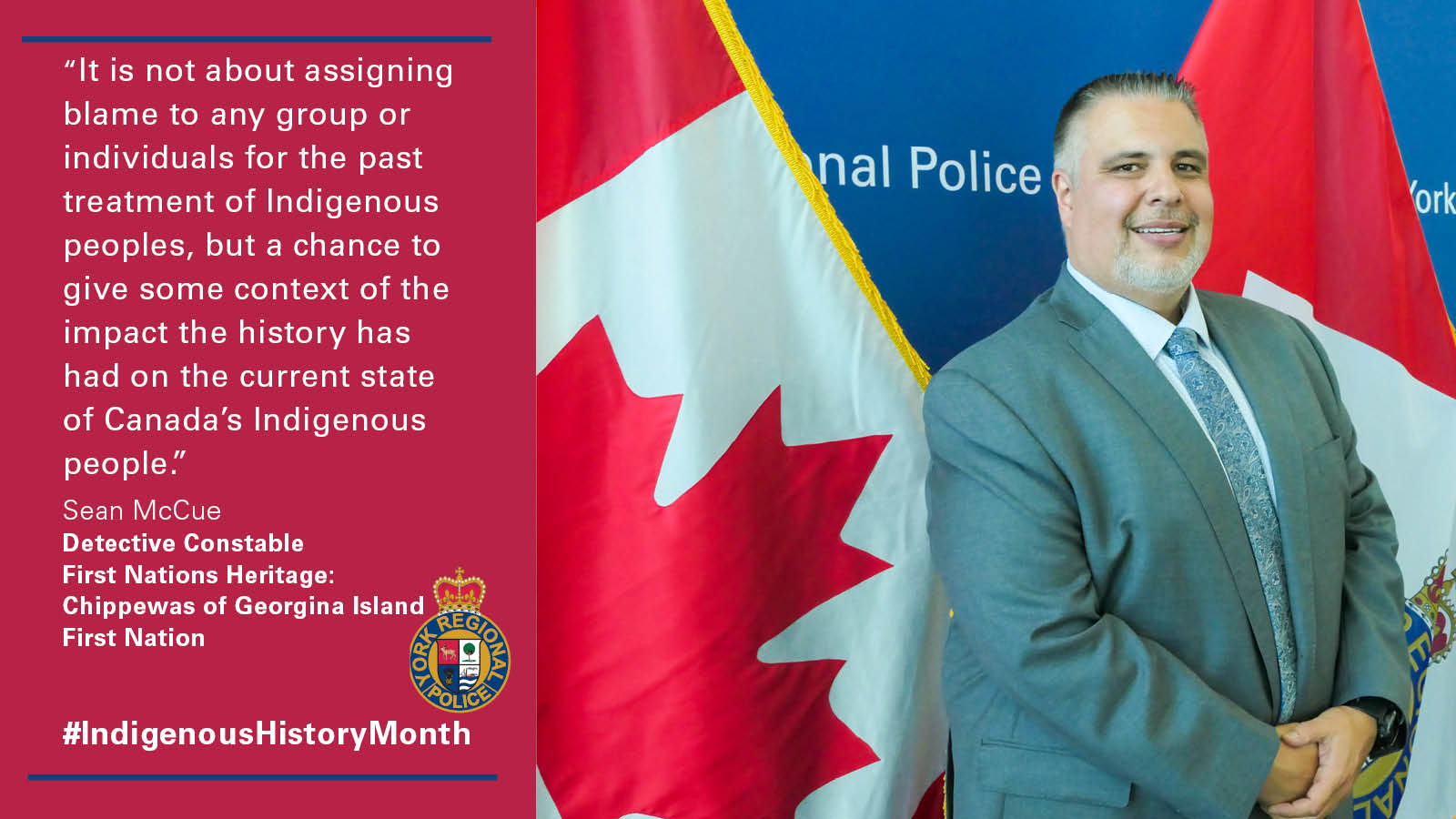
Position: Intimate Partner Violence Unit
Years of Service: 14
Work History: Frontline patrol in #1 and #3 District, before moving to IPVU
First Nations Heritage: Chippewas of Georgina Island First Nation
Why did you choose a career in policing?
I chose policing as a career for several reasons. I had a desire to be engaged with, and give back to, the community. And the team concept of policing was attractive to me, as I had always enjoyed being a part of teams growing up. I feel that more can be accomplished in a group setting, as opposed to individually.
What is a career highlight from your policing career?
There have been many memorable moments during my 14-year-career, including helping children, seniors, victims of crime and victims of intimate partner violence. There are too many highlights to pick just one, however I would say the friendships I have developed through my time working at YRP are what stand out the most.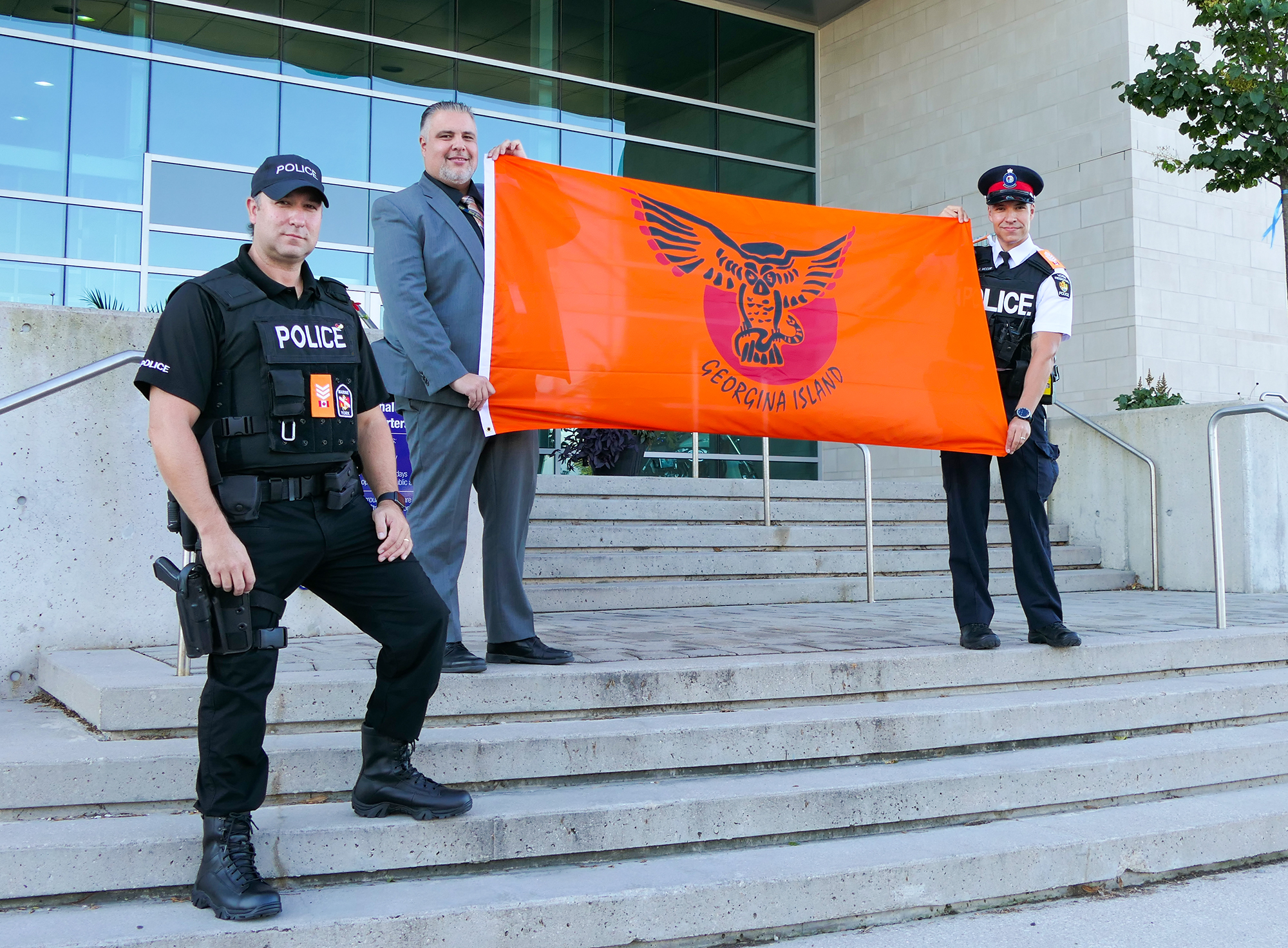
What advice do you have for anyone thinking of starting a career with YRP?
My advice would be to seek out and speak to members of the organization, both sworn and civilian, to learn their thoughts about their careers. Apply to do a ride along and see if you can do both a day shift and a night shift. The YRP volunteers program is also an excellent way to gain experience in learning how the organization operates in regards to community events.
How do you stay involved in your community?
I stay involved by engaging with community members and attending events. Obviously things have been difficult the past several years during the pandemic, with many events cancelled completely or being held through a virtual platform. It is exciting and encouraging to see in-person events are starting again and the opportunity for purposeful community engagement will once again present itself.
What does National Indigenous History Month mean to you?
Indigenous history month is important to me as it represents an opportunity for learning, healing and understanding. It is an opportunity to educate the general public about the true history of Canada’s Indigenous people. It is not about assigning blame to any group or individuals for the past treatment of Indigenous peoples, but a chance to give some context of the impact the history has had on the current state of Canada’s Indigenous people. The month also represents a great opportunity to celebrate Indigenous people’s accomplishments and to share and celebrate Indigenous culture with everyone.
Constable Sierra Durigon
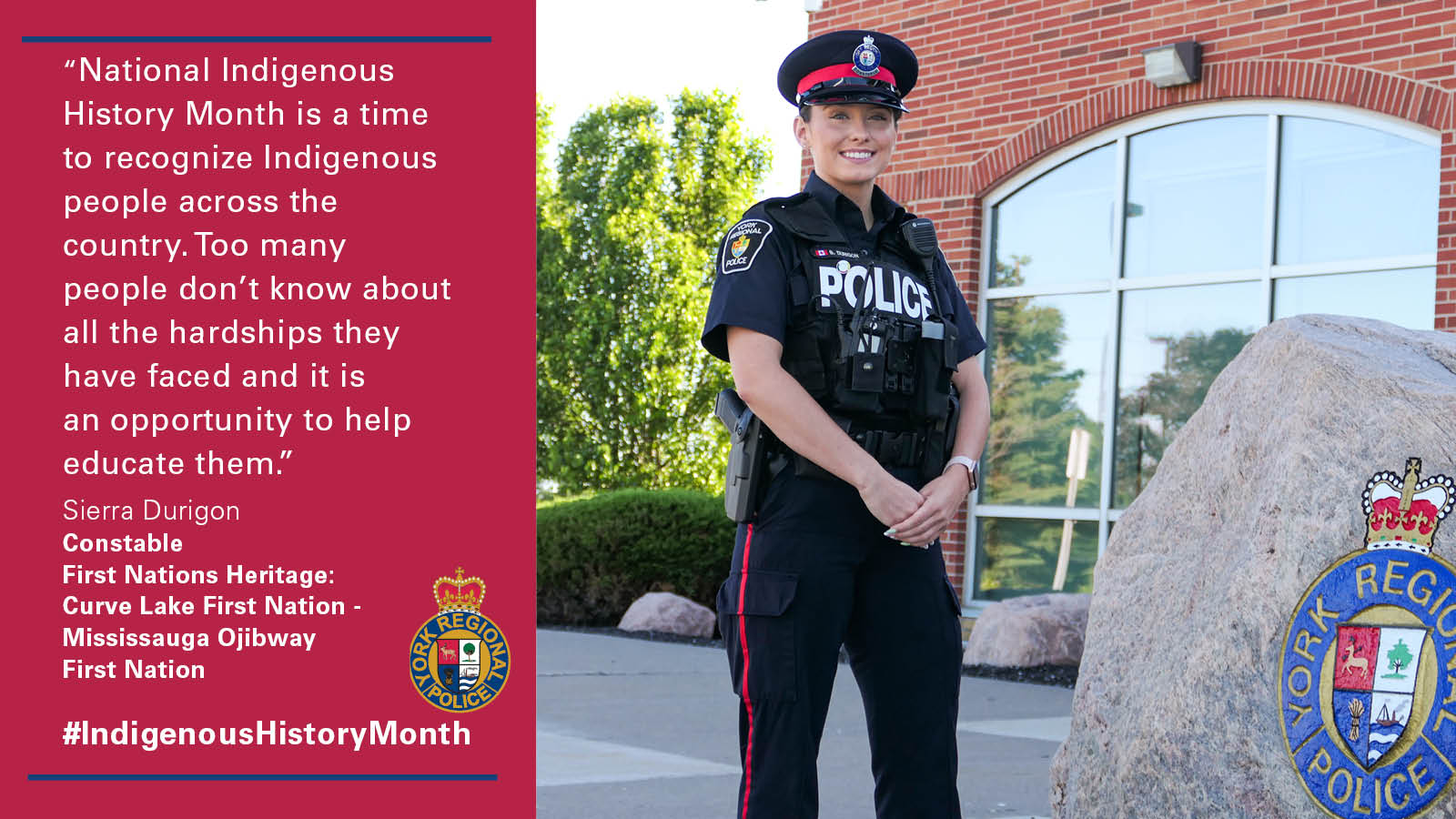
Position: Constable
Years of Service: 1
Work History: Prior to YRP, I worked loss prevention officer and was an auxiliary constable with YRP.
First Nations Heritage: Curve Lake First Nation - Mississauga Ojibway First Nation
Why did you choose a career in policing?
I always aspired to be a police officer and insisted I was going to catch people who break the law. I was fascinated by the role and the never-ending opportunities to grow and learn. There were school resource officers who often visited my school, only sparking the flame higher.
What is a career highlight from your policing career?
Even though I’ve just started, I’ve had opportunity to meet and connect with amazing people within the community, as well as YRP. Everyone has a story to tell and you can always learn something from listening to their stories.
What advice do you have for anyone thinking of starting a career with YRP?
If it is truly what you want to do, give it your all and go for it. Be persistent and do not give up. Failure is okay, so learn from it and do not get defeated. Your hard work and dedication will pay off. 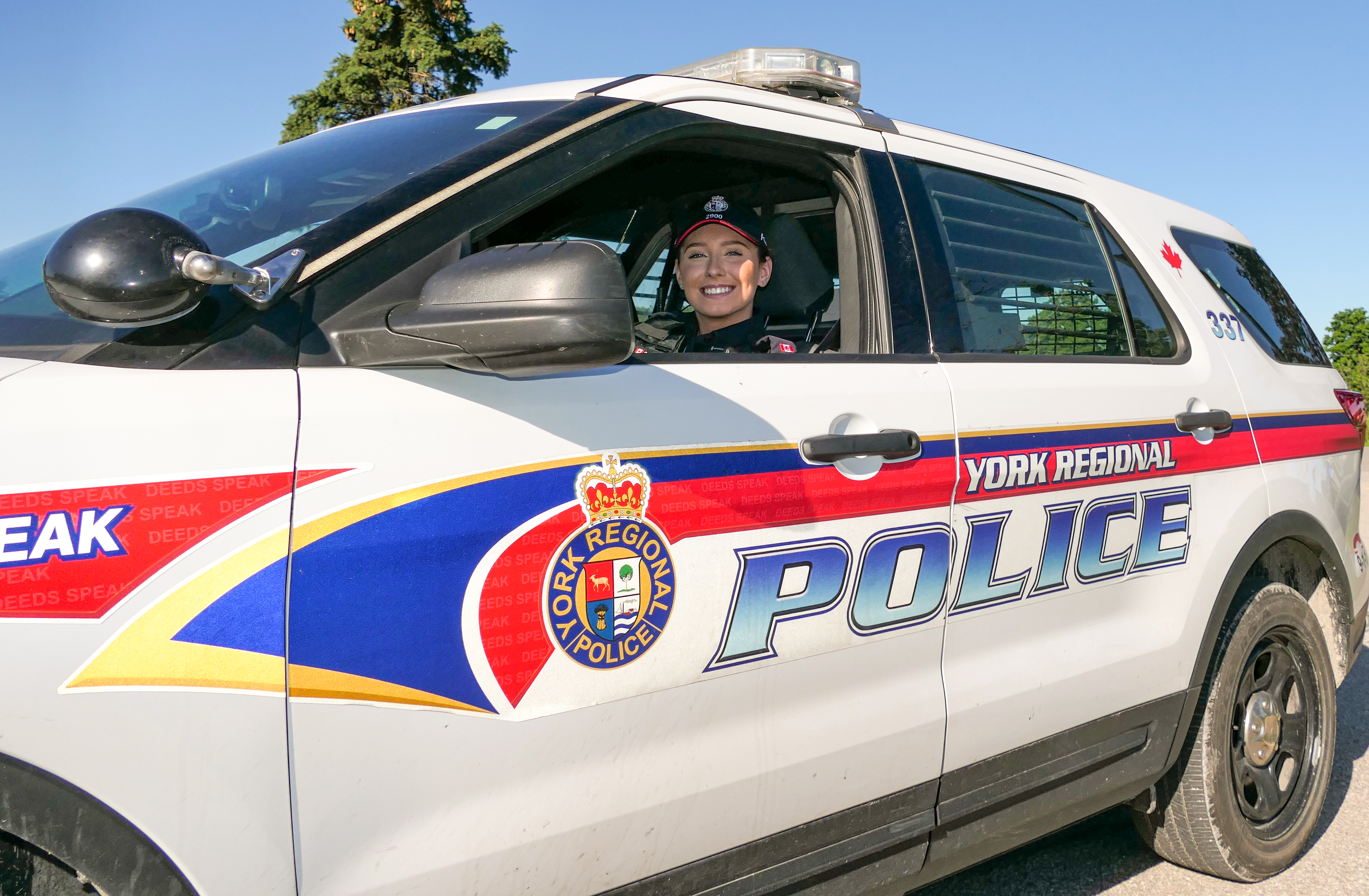
How do you stay involved in your community?
I take part in community events and fundraisers to stay connected to the community and foster relationships.
I am also trying to reconnect with my Indigenous community as my family was only recently granted status after changes to Bill C-31 and Bill S-3. Due to the Indian Act, my great grandmother lost her status when she married my great grandfather, who wasn’t Indigenous. When Bill C-3 was passed in 2011, it allowed eligible grandchildren of women who lost status for marrying non-Indigenous men to regain Indigenous status. My grandmother was entitled to registration.
In 2017, Bill S-3 was passed. It extended entitlement to descendants of woman impacted by sex-based discrimination dating back to 1869. This bill allowed my mother and my-self to gain Indigenous status.
What does National Indigenous History Month mean to you?
National Indigenous History Month is a time to recognize and share the history, heritage, resilience and diversity of First Nations, Inuit and Metis peoples across Canada. Too many people don’t know about all the hardships the First Nations community have faced and it is an opportunity to help educate them.
Staff Sergeant Josh McCue
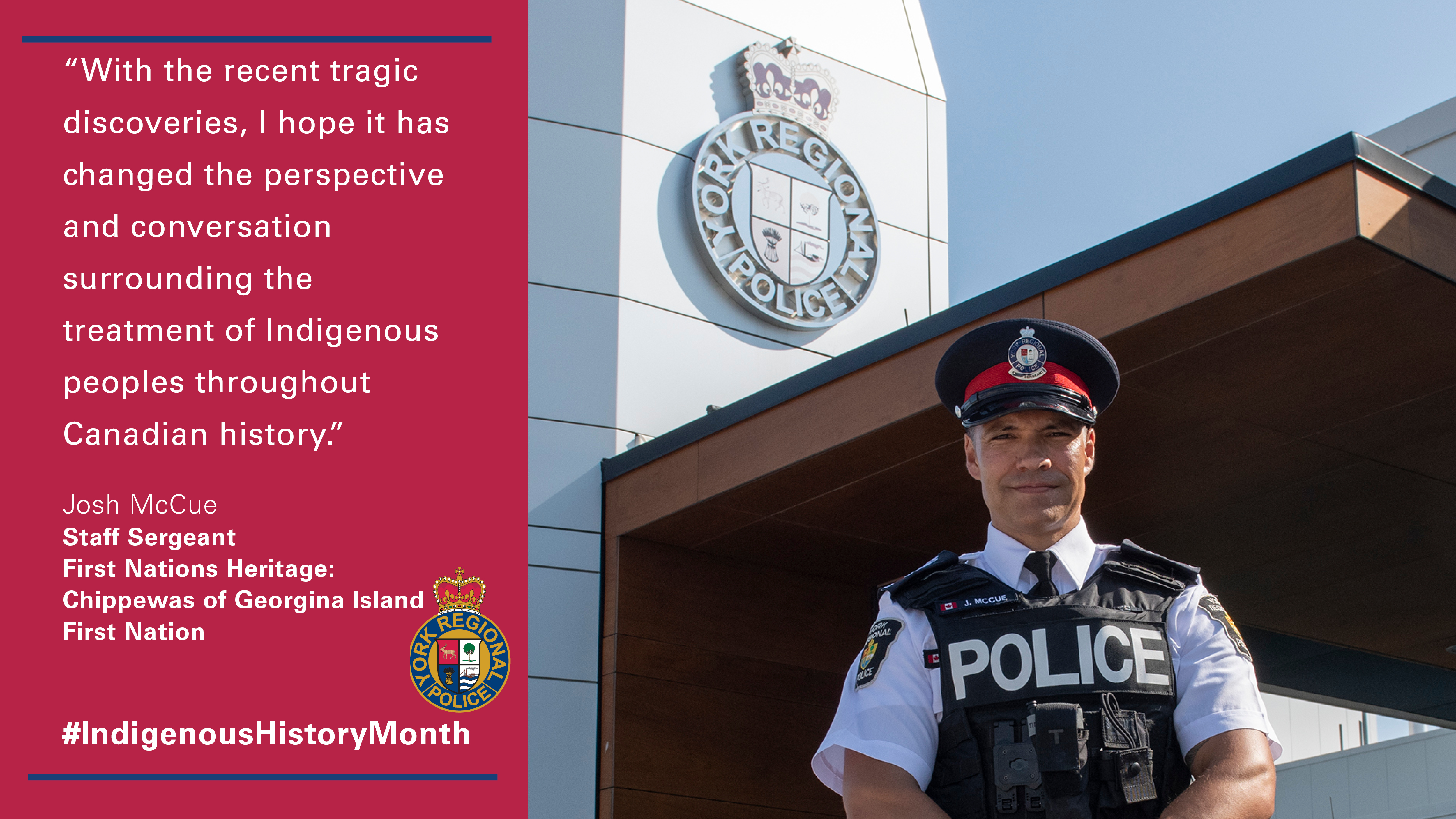
Name: Josh McCue
Position: Staff Sergeant , Training & Education Bureau - Practical Skills Unit
Years of Service: 19 Years
Work History: #5 District Uniform, Emergency Response Unit, #1 District Uniform, #3 District CIB, Operational Command , #3 District Uniform, Training and Education Bureau
First Nations Heritage: Chippewas of Georgina Island First Nation
Why did you choose a career in policing?
When I was considering a career in policing, I spoke with my cousin and his wife, who were already officers with YRP. They solidified my decision to pursue this exciting and meaningful career that allows me to affect the public in a positive way.
What is a career highlight from your policing career?
I have been fortunate to work in many areas of the organization, I have had so many highlights. Throughout all my assignments, I have worked with great team-oriented colleagues and have accomplished many personal and organizational goals. I can’t pinpoint just one moment and I’m looking forward to creating many more. 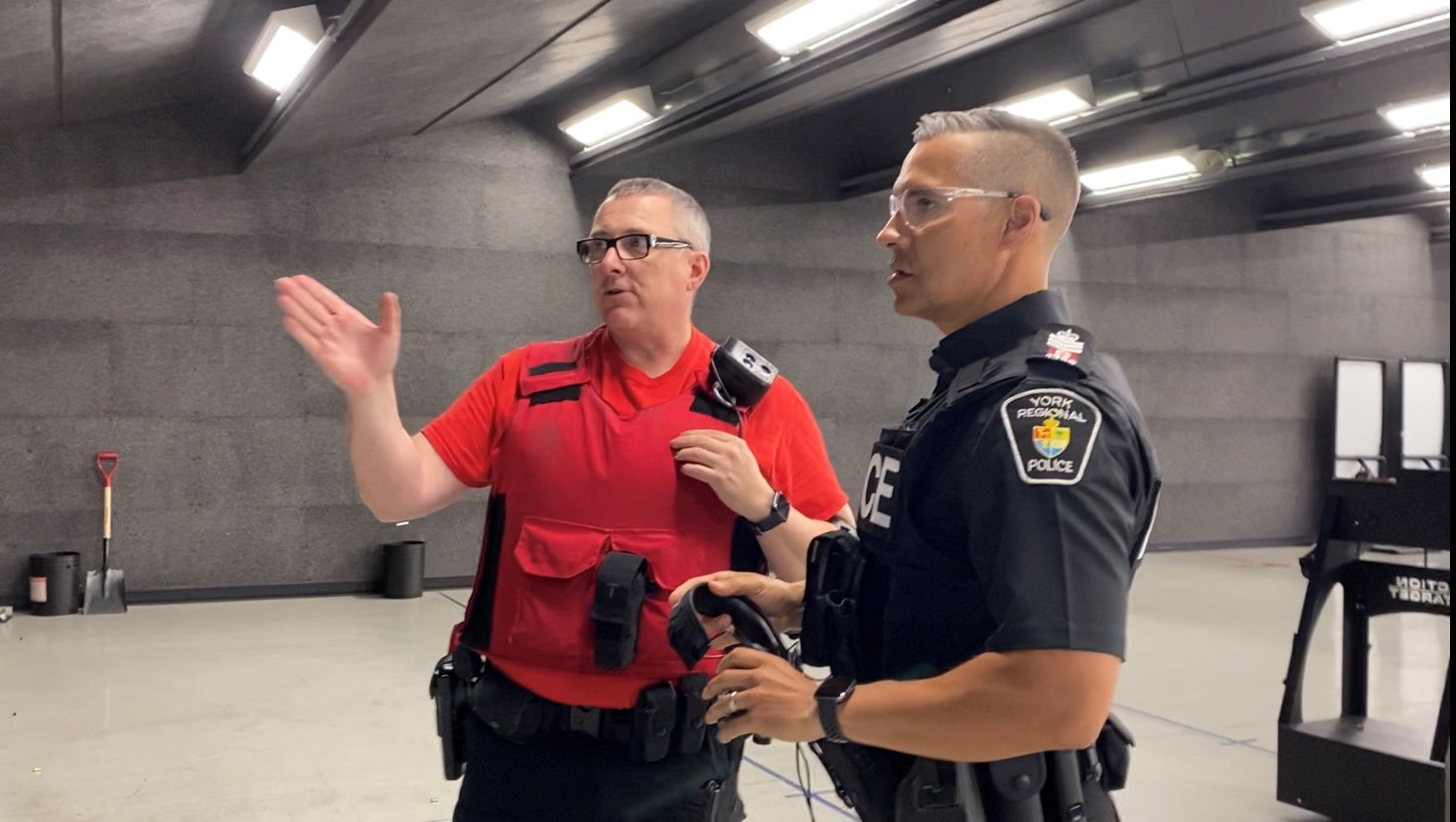
What advice do you have for anyone thinking of starting a career with YRP?
Pursue it! Reach out and take the initiative to find out what you need to do to make it happen. Policing is a unique profession where you can have many careers within one organization and still have such a positive impact within the community.
How do you stay involved in your community?
Ever since I started at YRP, I have taken part in the Chippewas of Georgina Island annual Chief’s Picnic and YRP career fairs and community presentations. I enjoy building connections with the community naturally. It’s an amazing feeling when people come up to me at events and call me by my first name. That’s when I know I have built a relationship with them based on mutual trust and respect.
What does National Indigenous History Month mean to you?
It has changed over the last few years with the recent tragic discoveries. I hope that this has changed the perspective and conversation about Canada’s history.
But it’s also a time to celebrate the successes and contributions of all Indigenous peoples. I feel proud of my culture and my family. I’m also proud that this month is celebrated within YRP and it makes me feel truly supported by our organization.











